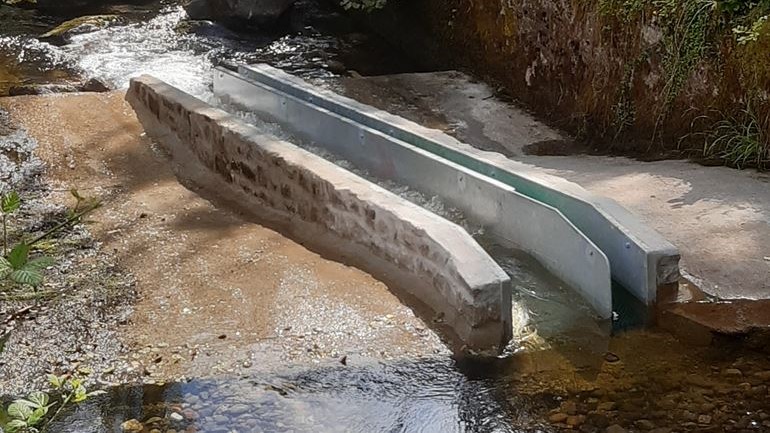A river restoration scheme with ambitions to open up spawning grounds for migratory fish has recently been completed on the Afon Clydach near Llangadog, Wales.
The scheme is part of the river restoration work managed by Natural Resources Wales’s (NRW) Four Rivers for LIFE Project.
Jerusalem Weir was posing a significant barrier for salmon and other fish trying to reach further upstream to spawn.
Ideally, barriers to fish migration should be removed completely to fully connect river habitats.
However, given that Jerusalem Weir supports the abutments of the historic bridge upstream, it was decided that the best approach would be to install a Larinier fish pass into the current weir structure.
This type of fish pass reduces flow velocities and, as a result, improves passage of salmon and trout, as well as a range of weaker swimming species.
The design also includes a side slot fitted with bristles to help eel and lamprey move up the river.
Four Rivers for LIFE Project Manager Susie Kinghan said:
“Free and unrestricted access between the river and the sea is essential for salmon and other fish to complete their life cycle. Salmon spend the first three years of their life in rivers before migrating to sea to grow and mature, and then return to their river of origin to spawn.
“This scheme should significantly improve the movement of salmon further upstream and their access to important breeding areas. It will also benefit lamprey and eel.”
The fish pass was originally developed by NRW’s Fisheries Department in collaboration with specialist consultants Fishtek.
Dave Charlesworth, Freshwater Fisheries Lead Specialist for NRW, said:
“Salmon populations in Wales are suffering the effects of climate change right now and it is essential that we identify and protect strongholds within river catchments where they continue to spawn successfully.
“We hope this scheme contributes to an increase in the numbers of salmon and other migratory fish species in this river over the coming years.”
The Clydach is a tributary of the River Tywi Special Area of Conservation (SAC). Both rivers are important and protected for a variety of migratory fish such as salmon and lamprey.
The work at Jerusalem Weir to install the fish pass took two weeks to complete, and was done by specialist contractor Paul’s Plant Hire.
Jerusalem Weir, the associated mill leat, and bridge upstream are all listed as Historic Environment Records. The project worked closely with Heneb (the Trust for Welsh archaeology) to ensure no damage was made to the historical environment.
The project was funded by the EU LIFE funded Four Rivers for LIFE Project.



